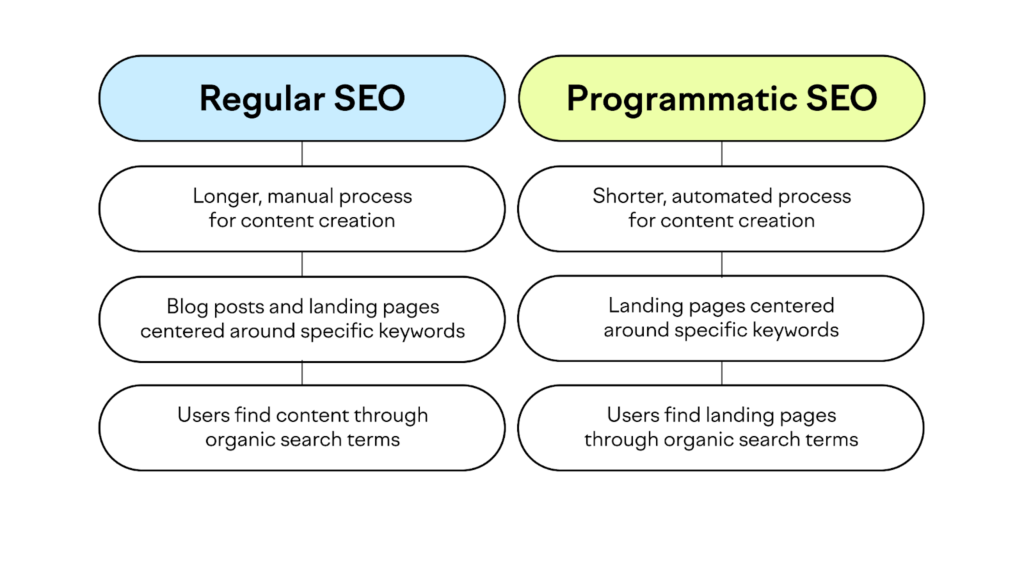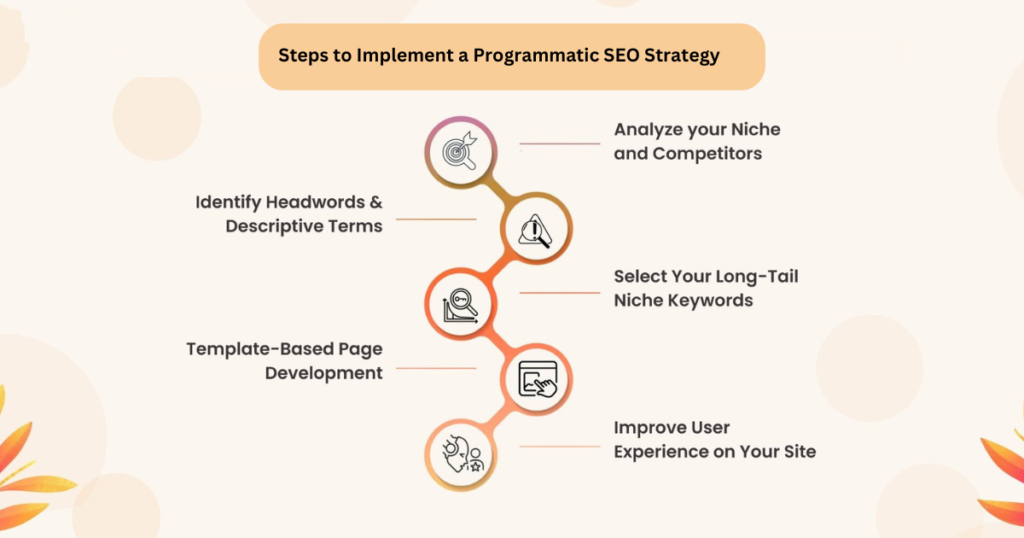Programmatic SEO in WordPress is revolutionizing digital marketing by leveraging automation to boost online visibility. This strategy enables the creation of content at scale, targeting a vast array of long-tail keywords to attract a wider audience. By automating the SEO process, businesses can significantly enhance their website’s search engine ranking, ensuring their brand stands out in a crowded digital landscape.
What Is Programmatic SEO?
Programmatic SEO is a methodical approach that utilizes software to automate the creation of web pages, aiming to target a vast array of long-tail keywords. This technique focuses on generating high-quality, relevant content en masse, tailored to specific queries within a niche.
By doing so, it significantly expands a website’s footprint on search engine results pages (SERPs), capturing a broader audience. In WordPress, this means leveraging plugins and scripts to systematically produce content that meets the nuanced demands of today’s internet users, thereby enhancing visibility and engagement.
Regular SEO vs. Programmatic SEO

The distinction between regular SEO and Programmatic SEO lies in their scope and execution. Traditional SEO practices involve manually optimizing individual pages for specific keywords, focusing on quality content, backlinks, and user experience. While these principles remain foundational, Programmatic SEO introduces an element of automation and scalability.
It goes beyond the page-by-page approach, using algorithms to identify keyword opportunities across a spectrum and creating content at a scale that manual processes cannot match. This shift does not diminish the importance of content quality but rather amplifies its reach through strategic, automated production.
Advantages of Programmatic SEO for Businesses
Efficiency and Scale
Programmatic SEO empowers businesses to rapidly scale their online presence. By automating content creation, companies can target thousands of keywords across different niches without the time constraints tied to manual writing.
Data-driven Decisions
This approach relies on extensive data analysis to identify keyword opportunities and trends. Such insights ensure that the content produced is aligned with user intent and market demand, increasing the likelihood of engagement and conversion.
Improved ROI
With Programmatic SEO, businesses can achieve a broader reach at a fraction of the cost associated with traditional SEO strategies. This efficiency translates to a higher return on investment, as the automated system continuously works to attract organic traffic without ongoing manual effort.
Steps to Implement a Programmatic SEO Strategy

Research Your Niche and Competitors
Start by understanding your market and identifying what your competitors are doing right. Use tools to analyze keywords and content strategies that resonate within your niche.
Find Your Head Terms and Modifiers
Identify the core terms related to your business and the modifiers that potential customers might use in their search queries. This foundation will guide the automated content creation process.
Pick Your Long-Tail Keywords
Long-tail keywords, being more specific and less competitive, are perfect for Programmatic SEO. Tools can help you discover these gems that directly address user queries.
Build Your Landing Page Template
Design templates that can be dynamically filled with content generated for different keywords. Ensure these templates are SEO-friendly and optimized for user experience.
Optimize Your UX
User experience (UX) remains paramount. Even automated content must provide value and ease of navigation to encourage engagement and reduce bounce rates.
Related Article: The Impact of UX on SEO Rankings: A Comprehensive Analysis
Conclusion
Programmatic SEO represents a seismic shift in how businesses approach search engine optimization, particularly within the WordPress ecosystem. By embracing this innovative strategy, companies can unlock unprecedented efficiency, scalability, and data-driven precision in their digital marketing efforts.
Implementing Programmatic SEO requires a blend of technical understanding and strategic foresight, but the potential rewards in terms of visibility, engagement, and ROI are immense. As the digital landscape continues to evolve, staying ahead of the curve with Programmatic SEO could well be the key to maximizing your site’s potential.
Frequently-Asked Questions (FAQS)
Is WordPress good for programmatic SEO?
Yes, WordPress is an excellent platform for programmatic SEO due to its flexibility, extensive plugin ecosystem, and ease of content management. WordPress allows for the automation of content creation and SEO tasks, making it suitable for implementing programmatic SEO strategies effectively.
Do I need an SEO plugin for WordPress?
While WordPress is SEO-friendly out of the box, using an SEO plugin can significantly enhance your website’s search engine optimization. SEO plugins provide additional features and tools to optimize your content, improve your site’s visibility, and manage technical SEO aspects more efficiently.
Do I have to design my pages in WordPress?
Designing pages in WordPress is highly recommended for maintaining brand consistency and providing a positive user experience. WordPress offers various themes and page builders that make it easy to design custom pages without needing to code from scratch. However, the level of customization and design effort depends on your specific needs and goals.
We are using another CMS than WordPress, can we integrate SEOmatic to it? Do you host the pages as well?
While SEOmatic (or similar SEO tools and plugins) may be specifically designed for WordPress, many CMS platforms have equivalent SEO tools or plugins available. It’s important to research and find the best SEO solution that is compatible with your CMS. Regarding hosting, SEO tools typically do not include hosting services. You would need to arrange hosting separately with a hosting provider that supports your CMS.
We aren’t using a CMS. Do you also provide hosting services for our website?
If you’re not using a CMS and are looking for hosting services, there are numerous web hosting providers that can host your custom-built website. While some companies specialize in hosting for specific CMS platforms like WordPress, most hosting providers offer versatile hosting plans that can accommodate websites built on various technologies. You would need to select a hosting provider based on your specific requirements, such as server type, bandwidth needs, security features, and scalability options.

